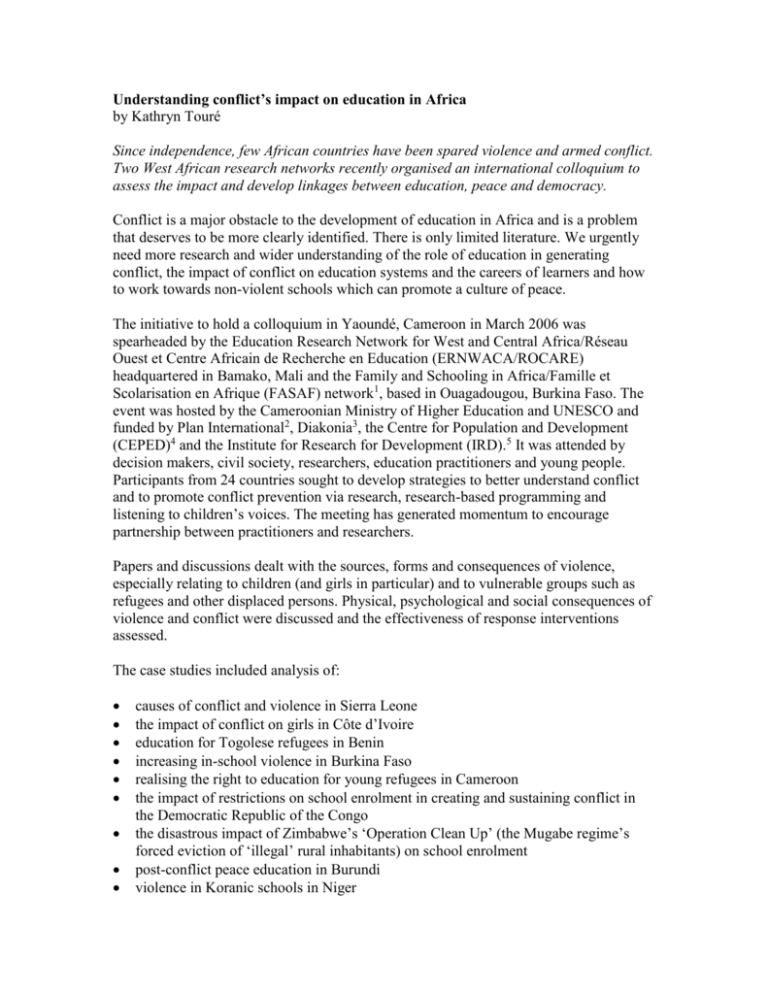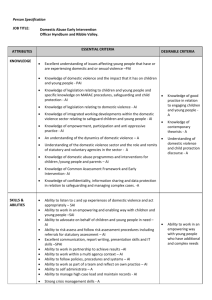
Understanding conflict’s impact on education in Africa
by Kathryn Touré
Since independence, few African countries have been spared violence and armed conflict.
Two West African research networks recently organised an international colloquium to
assess the impact and develop linkages between education, peace and democracy.
Conflict is a major obstacle to the development of education in Africa and is a problem
that deserves to be more clearly identified. There is only limited literature. We urgently
need more research and wider understanding of the role of education in generating
conflict, the impact of conflict on education systems and the careers of learners and how
to work towards non-violent schools which can promote a culture of peace.
The initiative to hold a colloquium in Yaoundé, Cameroon in March 2006 was
spearheaded by the Education Research Network for West and Central Africa/Réseau
Ouest et Centre Africain de Recherche en Education (ERNWACA/ROCARE)
headquartered in Bamako, Mali and the Family and Schooling in Africa/Famille et
Scolarisation en Afrique (FASAF) network1, based in Ouagadougou, Burkina Faso. The
event was hosted by the Cameroonian Ministry of Higher Education and UNESCO and
funded by Plan International2, Diakonia3, the Centre for Population and Development
(CEPED)4 and the Institute for Research for Development (IRD).5 It was attended by
decision makers, civil society, researchers, education practitioners and young people.
Participants from 24 countries sought to develop strategies to better understand conflict
and to promote conflict prevention via research, research-based programming and
listening to children’s voices. The meeting has generated momentum to encourage
partnership between practitioners and researchers.
Papers and discussions dealt with the sources, forms and consequences of violence,
especially relating to children (and girls in particular) and to vulnerable groups such as
refugees and other displaced persons. Physical, psychological and social consequences of
violence and conflict were discussed and the effectiveness of response interventions
assessed.
The case studies included analysis of:
causes of conflict and violence in Sierra Leone
the impact of conflict on girls in Côte d’Ivoire
education for Togolese refugees in Benin
increasing in-school violence in Burkina Faso
realising the right to education for young refugees in Cameroon
the impact of restrictions on school enrolment in creating and sustaining conflict in
the Democratic Republic of the Congo
the disastrous impact of Zimbabwe’s ‘Operation Clean Up’ (the Mugabe regime’s
forced eviction of ‘illegal’ rural inhabitants) on school enrolment
post-conflict peace education in Burundi
violence in Koranic schools in Niger
sexual harassment in schools in Cameroon and Congo
the role of life skills education
education for demobilised child soldiers in Congo
the impact of lack of in-school sanitation on pupils, especially girls
HIV/AIDS education in Ugandan primary schools.
As part of the colloquium, the University of Yaoundé I organised a roundtable discussion
at the Ecole Normale Supérieure (teaching training college) on the reality of sexual
harassment in educational institutions. The issue of gender-based symbolic and sexual
violence within schools and the impact of sexist stereotypes in school textbooks remain
little documented. Participants insisted on a holistic approach, because violence in
schools is not made up of isolated cases of violence but rather flows from society and the
family.
The impact of crisis situations on educational systems is significant and of a variety of
kinds. Violence and conflict have become a part of everyday life and threaten education
and societal development on the African continent. Studies and actions should therefore
be included as part of prevention and reconciliation, and in the framework of peace
building leading toward attainment of quality Education for All (EFA) and the
Millennium Development Goals (MDG).
Growing levels of violence and conflict in homes, schools and communities require
research-based and community-supported action. As more and more initiatives are
undertaken to institute democratic values, African researchers must also study how
tradition promotes conflict and the value of traditional practices in conflict prevention
and resolution. As rules and institutional mediation are not sufficient for peace we need to
use ethnographic and other qualitative approaches to study lived experience. Above all,
we need to value teachers as the most critical resource in education reconstruction and we
need to listen to young people – for their voices are often silenced by those of adults.
Kathryn Touré is coordinator of ERNWACA / ROCARE (www.rocare.org). Email:
tourek@rocare.org. Colloquium papers – in English and/or French are available at
www.rocare.org/colloque_fasaf_rocare.htm. For additional information, to join the postcolloquium electronic discussion list or to obtain a CD-ROM of papers presented, contact
Tècle-Mireille Massouka, ROCARE / ERNWACA, BP E 1854, Bamako, Mali. Tel: +
223 2211612. Email: mmassouka@rocare.org
1
www.fasaf.org
www.plan-international.org
3
www.diakonia-world.org
4
http://ceped.cirad.fr
5
www.ird.fr
2










